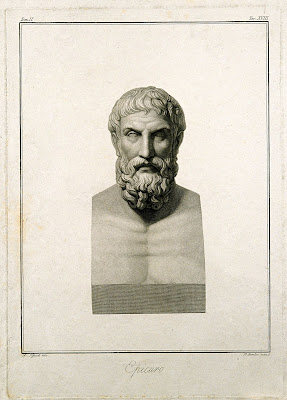Losing our fear of the gods: the first of five, very short, morning reflections on the philosophy of Epicurus for BBC Radio Cambridgeshire
 Talk 1—Losing our fear of the gods
Talk 1—Losing our fear of the gods(Hear the talk for a limited period of time at this link. The piece starts 18 minutes into the programme and finishes three minutes later.)
In the 3rd century BCE, the Greek philosopher Epicurus developed a philosophy, the ultimate goal of which was a kind of peace of mind or tranquility that he called “ataraxia”. To achieve this he believed at least three common fears needed to be addressed and removed: fear of the gods, fear of an afterlife, and fear of death.
Today we’ll consider the fear of the gods.
Epicurus believed the gods existed but there is some ambiguity about exactly what he meant by this; one common interpretation is that he thought they were human projections of what the most blessed life would look like. But, in any case, Epicurus felt that most people were fearful of the gods because they wrongly believed them to be powerful, supernatural beings who are constantly concerned about what we do and who, in response to our actions, dispense upon us various punishments or rewards. In consequence, many people have come to believe that they must worship and sacrifice to the gods in order to win, or regain, their favour.
However, for Epicurus, the most characteristic thing about the gods was their imperishable and blessed being which allowed them to live completely tranquil lives, utterly unconcerned about what we got up to. In short, the gods (whatever they were), simply left us to our own devices and whatever happened to us was always and only the result of purely natural forces.
When thought of like this — as supreme fictions, poetic exemplars of an ideal life — the only influence the gods could have upon us was when we sought to emulate their tranquility in our own lives. Indeed, Epicurus once memorably said he was:
. . . prepared to compete with [the god] Zeus in happiness, as long as he had a barley cake and some water (Aelian, “Miscellaneous Histories”, 4.13 [text 159]).
When an ancient or modern follower of Epicurus gratefully sits down to an equally modest breakfast it is worth pondering upon the fact that they do so blessedly free from a fear of the gods.
The first talk can be found at this link
The second talk can be found at this link
The third talk can be found at this link
The fourth talk can be found at this link
The fifth talk can be found at this link


Comments